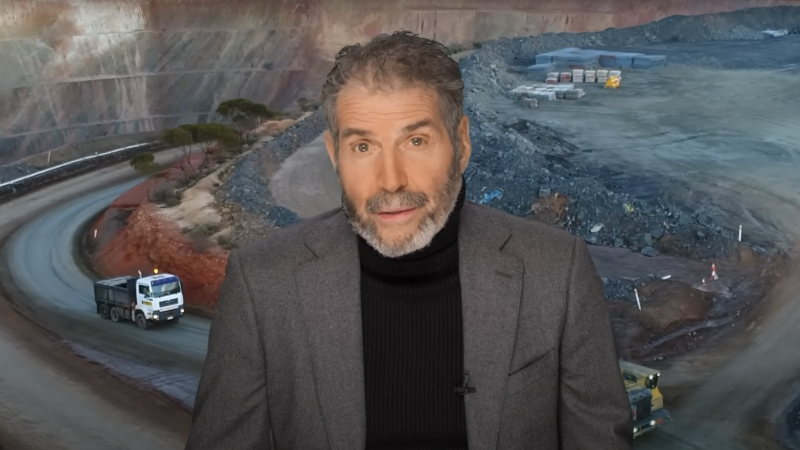Mining Is Safer, Cleaner, and More Ethical in America. So Why Do Environmentalists Stand in the Way?
The U.S. now ranks second to last in the time it takes to develop a new mine—roughly 29 years. Only Zambia is worse.

People eagerly give money to rich environmental groups. The Natural Resources Defense Council (NRDC) has $463 million in assets.
It claims it uses law "to confront the climate crisis."
What it really does is pay lawyers to torture people who try to do useful things.
Example: America needs minerals like copper and silver to make things. Even President Joe Biden made a speech saying America will need 400-600 percent more such minerals to make "solar panels, wind turbines, and so much more!"
An iPhone alone requires aluminum, iron, lithium, gold, copper.
But when investors dare try to dig up such minerals in America, the NRDC objects and uses political connections to stop them.
Twenty years ago, entrepreneurs tried to open a mine in Alaska. Before they even got the application in, the Environment Protection Agency (EPA) vetoed it.
Why? Because groups like the NRDC say the mine "would be a catastrophic threat to the wildlife and…fragile ecosystem."
They get their way because when Democrats run the EPA, they not only support NRDC's positions, they even hire NRDC employees.
The next Republican administration removed the EPA's veto. The Army Corps of Engineers then studied the mine and concluded that it wasn't an environmental threat.
So, is Pebble a bustling mine today? No.
Democrats got elected and vetoed it again.
Physicist Mark Mills wonders why anyone would try to open a mine in America today. "Why in the world would you put millions, maybe billions of dollars at risk, spending those decades to get a permit, knowing there's a very good chance they'll just cancel a permit? How in the world do you build mines in America knowing that that's the landscape you have?"
Well, you don't.
America now ranks second to last in the time it takes to develop a new mine—roughly 29 years. Only Zambia is worse.
"You start applying for permits," says Mills, "You're going to be waiting not months, not years, but decades!"
Waiting while the NRDC sues and runs frightening anti-mine ads, saying nature will be "destroyed by a 2,000-foot gaping hole in the ground!"
Mills points out their deceit. Today's mines disturb "a tiny infinitesimal pinprick in the landscape" and we do need to disturb the landscape a little, because "we need metals and materials and minerals to build everything that exists to make society possible!"
I confronted NRDC spokesman Bob Deans, saying the NRDC killing mines also kills people's opportunity. He responded that "clean" energy creates jobs.
"We created 50,000 new jobs in this country, putting up wind turbines, solar panels, building the next generation of energy efficient cars. This is where the future is!"
"But also, you need copper and gold," I point out.
"That's right," says Deans, "And we have to weigh those risks."
But the NRDC doesn't weigh the risks. They just oppose American mines.
I asked Deans, "Are there any mines that the NRDC doesn't complain about?
"Sure," he replied.
He said he'd send us some names. But he never did.
I asked again this month. Again, no names.
"Don't hold your breath," says Mills. "The mines that they implicitly support are in Africa."
"Implicitly" because they don't actually say mining should be done in poor countries.
"They don't say that," says Mills, "But the green movement has been perfectly happy outsourcing mining to disadvantaged countries where thousands of children in bare feet, working by hand with shovels, dig minerals out of the earth."
At least in America, children wouldn't be digging with their hands, advanced equipment would make mining safer, and our rules would reduce pollution. You'd think environmentalists would want more mining done in America.
"To have a sane world," says Mills, "we should be doing a lot more of it. Not all of it. But not none."
Allowing America to do more would definitely be good. Our future needs minerals.
"Society can't exist without mines," concludes Mills.
COPYRIGHT 2024 BY JFS PRODUCTIONS INC.
